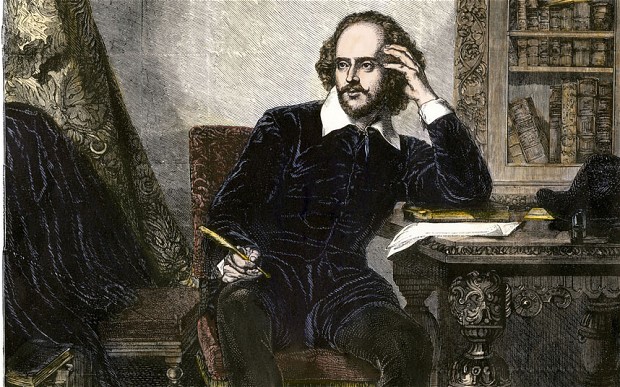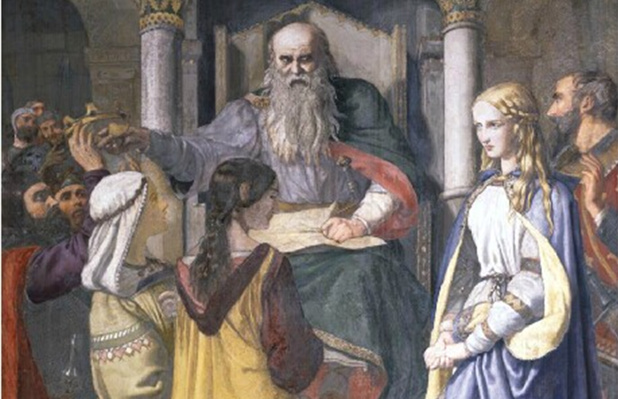What makes Shakespeare the cultural symbol of Britain?


Shakespeare and his play King Lear (act I)
In the 2012 London Olympic Games, literature played a central role in the opening ceremony, with Shakespeare providing the theme “Isles of Wonder.” The lines from Shakespeare’s play The Tempest echoed through the air: “Be not afeard. The isle is full of noises, sounds and sweet airs that give delight and hurt not.” According to a survey conducted by the British Council, Shakespeare is the most representative cultural symbol of the United Kingdom. As the vanguard of British culture, Shakespeare is a household name around the globe.
Cultural prestige conforms to British history
A great many factors contributed to Shakespeare’s cultural prestige. He was born in the period when the United Kingdom’s national power was increasingly on the rise under the reign of Elizabeth I. In the year 1588, the British fleet defeated the Spanish Armada, once known as the “Invincible Fleet,” signifying the rebirth of England as a great global colonial empire. English literature also blossomed in such a context. Many eminent poets and playwrights emerged, and Shakespeare was among them.
Shortly after his death, Shakespeare’s achievements as a patriotic poet were fully recognized by his contemporaries. Ben Jonson, in his poem “To the Memory of My Beloved the Author, Mr. William Shakespeare and What He Hath Left Us,” Johnson praised Shakespeare as the “soul of the era”. Shakespeare was represented in the poem as a kind of natural wonder whose genius was not subject to any rules. “He was not of an age, but for all time,” said Johnson, who asserted that natural genius is one of the most essential factors that make a great poet.
By the late 17th century and the early 18th century, many famous British poets and critics looked upon Shakespeare as the pride of their nation. John Dryden, in An Essay of Dramatic Poesie, wrote: “All the images of Nature were still present to him, and he drew them not laboriously but luckily. When he describes anything, you more than see it, you feel it too. He needed not the spectacles of books to read Nature. He looked inwards and found her there.”
Dryden spoke highly of Shakespeare’s exceptional ability to portray internal psychological activities. From the perspective of cultural localization, Johnson developed the concept of genius.
Alexander Pope, a Neo-Classicist poet, in his six-volume The Works of Shakespeare, affirmed Shakespeare’s ingenuity and commended his subtle portrayal of human nature. “How astonishing is it again that the passions directly opposite to these, Laughter and Spleen, are no less at his command; that he is not more a master of the Great than of the Ridiculous in human nature,” said Pope.
Edward Young, an English poet, also commended Shakespeare’s novelty in literary creation in his work Conjectures on Original Composition. He also called for modernist writers like Shakespeare.
Samuel Johnson, a literary master of England in the 18th century, also did a good deal to help create the traditional view of Shakespeare’s classical role as a poet. He dedicated as much as nine years to compile the eight-volume The Plays of William Shakespeare, which is vital to the historical process of how Shakespeare’s unparalleled role was gradually accepted. Johnson proposed that to truly measure the value of literature, a century is needed.
It was not until 150 years after Shakespeare’s death that the master began to enjoy the praise normally reserved for the ancient saints. The way in which Shakespeare perceived human nature was quite incisive and penetrating. The figures he depicted stood beyond the confinement of regional conventions and represented the common offspring of humanity.
At the end of the 18th century and the beginning of the 19th century, British Romanticism emerged, which stressed the originality and novelty of works. To Romantic poets, the minds of poets are the fountainhead of poems, and poems are the testaments of poetic genius. Shakespeare’s naturally endowed writing competence, excellent fantasy and brave notions tally well with the aesthetic concept.
If we say that Shakespeare’s literary attainments were approaching its acme in the Romantic Period, the Victorian Period, when Britain had become the world strongest industrial country witnessed the culmination of Shakespeare’s literary recognition. It was a period when British world maps showed the empire in red and pink to highlight British imperial power spanning across the globe. At that time, Britain was in its prime, and people felt proud of the splendor that their country created. As the outstanding representative of English culture, Shakespeare stood at the forefront.
Thomas Carlyle’s On Heroes, Hero-Worship, and The Heroic in History clarified Shakespeare’s heroic role in poetry composition. In Carlyle’s eyes, Shakespeare is even greater than Dante. Matthew Arnold, a cultural lord of the Victorian Period also held Shakespeare in high esteem. In his poem Shakespeare, Arnold compared Shakespeare’s grandeur to the top of a mountain, which is insurmountable. To Arnold, Shakespeare’s insights into human nature and understanding of folk traditions are of redemptive significance in terms of religion. Shakespeare’s cultural status reached its peak in the Victorian period, when Britain was at the zenith of its power. This is not a coincidence but a corollary that Shakespeare’s literary accomplishment conformed to the national development, imperial expansion and social reform.
Inspiration to later generations
In the 19th century, Shakespeare’s reputation was flourishing. His exulted literary status seemed unrivaled. When the famous modernist playwright George Shaw castigated Shakespeare, challenging his unrivaled status, it was quite beyond many writers’ expectations. Shaw was a steadfast advocate of the pragmatic function of plays, and that was why he chided Shakespeare for not shouldering the moral and educational responsibilities of a playwright. In his view, “Shakespeare was only of an afternoon instead of a century.”
However, the social pragmatism that Shaw valued was actually dogmatism in its narrowest sense. History has proven that Shaw’s works overemphasized the life of his period, which meant that his dated topics failed to captivate the readers of later generations. By contrast, Shakespeare’s works appealed to common sense and universal themes of human nature, giving them a staying power that enabled them to withstand the test of time.
In response to the negative comments on Shakespeare, Andrew Bradley, in his classical work Shakespearean Tragedy (1904), analyzed the profundity and complexity of the characters in Shakespearean plays. Such far-reaching study by Bradley widely influenced Shakespearean criticism. It was Bradley who greatly enriched the study on Shakespeare.
In the 20th century, many of Shakespeare’s works were adapted to films, which had become an effective way to promote Shakespearean study. On the 400th anniversary of Shakespeare’s death, George Steiner said, “What he has made come true, over and over and over, is our good intentions, our compassion and our utopias. In the realm of life experiences, he strikes a chord in readers.”
What is noteworthy is that a tide of Classicism made a comeback in the Western academy after the post-Modernist anti-Classicist movement. The American literary critic Harold Bloom in his The Western Canon: The Books and School of the Ages, reiterated the pioneering role of Shakespeare in the literary field.
He examined Shakespeare in connection with other writers and came to the conclusion that it was Shakespeare who inspired many great writers of later generations in the Western world, stirring up a multitude of sentiments—compassion, defiance, self-introspection and self-motivation.
China seeks own cultural symbol
Looking back on the historical process of how Shakespeare became the biggest cultural symbol of Britain, we cannot help but wonder: Is there any figure in China that could be an analogous Chinese cultural symbol?
In calling for a cultural symbol of China similar to Alexander Pushkin of Russia or America’s Walt Whitman, China perhaps could shift its focus to the poet Li Bai, a great genius of Chinese poetry. Having far-reaching influence on Chinese literature and culture, Li Bai inspired people from different countries in different times with the aesthetical inclination in his poems. Therefore, to spread Chinese culture across the world, Li Bai can be selected as the representative of Chinese literature. The rich resilience of thought and humanity in Li Bai and his works can be fully used to make him the most typical and most brilliant symbol of Chinese culture.
Wang Shouren is from the School of Foreign Studies at Nanjing University.
The Chinese version appeared in Chinese Social Sciences Today, No.619, July 11, 2014.
Edited and translated by Bai Le
The Chinese link:
